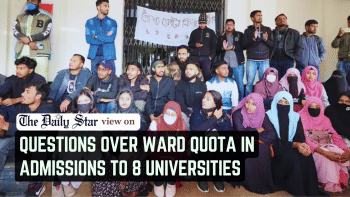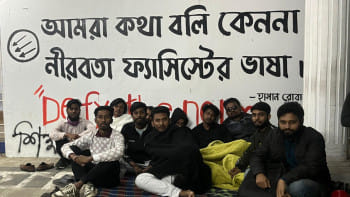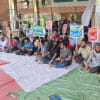Education deserves a reform commission

In his first address to the nation on August 25, 2024, Chief Adviser Prof Muhammad Yunus stated that the misrule of the previous government had crippled the education system and had created anarchy at all levels of education. He declared that comprehensive education reform was a promise of the interim government, that the work on developing a curriculum suited to changing times would commence, and that an urgent task was to restart educational institutions in a creative, safe, and learner-friendly environment.
On September 11, Prof Yunus announced the formation of six independent commissions to work on reforms of the constitution, the electoral system, the judiciary, the police, the Anti-Corruption Commission (ACC), and public administration. Another set of five commissions was established on October 31 for reforms in health, mass media, workers' rights, local government, and women's rights. It is ironic that the student-led anti-discrimination uprising that precipitated the "state-repair" agenda did not lead to the appointment of an education reform commission.
The students' protest against discriminatory quotas in public service jobs was the spark that ignited a mass uprising against the entrenched and authoritarian oligarchy. It also drew attention to the poor quality of the education system, the lack of nurtured skills and competencies within educational institutions, and the opportunities denied to the majority of young people in a highly unequal system. Prof Yunus's motto of zero poverty, zero unemployment, and zero carbon emissions also implied a major rethink of education goals and methods.
So far, during the months of the interim government's tenure, we have seen ad hoc actions and decisions in education, mainly in the nature of firefighting to contain the chaos inherited from the past regime and arising from the turmoil of the protest movement. An initiative has been undertaken only for primary and non-formal education by the Ministry of Primary and Mass Education (MoPME), which appointed a nine-member "consultative committee" to recommend short-, medium- and long-term measures for improvement and reform in this sub-sector. The committee's work, headed by this writer, is underway, and its report is due by the end of January. While this is a positive step, it is a partial move that leaves major concerns in the education sector unaddressed. The work on primary education highlights the need for a comprehensive approach and holistic thinking about the education system, calling for political choices at the state level on education reform beyond the remit of MoPME alone.
Public and media discourse overwhelmingly favours the idea of a reform commission for education. However, the interim government has not expressed a definitive position on the matter. Why is there reluctance to set up a commission on education reform? Is it because such a commission may open Pandora's box, unleashing demands, protests, and counter-protests from an array of stakeholders—more than what is already being encountered? This is a legitimate concern. But will inaction or ad hoc measures stem the discontent and frustrations of students who have long been subjected to misguided policies and decisions that jeopardise their futures? What about the expectations of the nation that this opportunity for change and reform in education should not be lost? The interim government has waded into reform efforts in many difficult, complex, and sensitive spheres; why should education be left out?
Forming a commission, defining its tasks, and deciding its working mechanism in a field as complex and multifaceted as education demands careful consideration. The education sector encompasses major sub-sectors with distinct objectives, pedagogic approaches, beneficiaries, organisational arrangements, and state obligations. For instance, the challenges vary across sub-sectors such as primary and secondary education, vocational and technical skill development, higher general education, higher professional education, the parallel madrasa system, and non-formal lifelong learning. Policy responses and the scope of implementable measures by the state must be informed by an understanding of the distinct features of these sub-sectors as well as their interconnectedness.
It would make sense to allow the education reform commission more time—say, six months, rather than the usual three months allotted to other commissions—given the range of distinct sub-sectors within education. It is also necessary to ensure that individuals knowledgeable about the sub-sectors and those with insight into the holistic nature of education and its transformation are represented in the commission. Its working methods should ensure that each sub-sector receives due consideration.
Discussions and debates within the education community suggest that the following areas deserve special attention as part of the reform agenda:
i) Guiding efforts toward an education sector plan with a medium-term timeframe and a longer-term perspective. Some work was done in this respect with the participation of both education ministries and with support from UNESCO and the Global Partnership for Education in 2020. However, the government failed to follow it up, reflecting a lack of seriousness.
ii) The sector plan would prioritise a time-bound programme and strategy for universal primary and secondary education; market-linked vocational education and training; employment-responsive four-year colleges under the National University; and university expansion rigidly applying quality criteria.
iii) Rethinking teacher and education worker recruitment to attract and retain top talent in teaching.
iv) Creating a responsive, accountable, and decentralised education governance and management system, effectively utilising education resources, and substantially increasing public investment.
v) Helping to articulate the government's position on external assistance areas and priorities aligned with the proposed sector plan and strategies for various subsectors.
The education commission may operate somewhat differently from other reform commissions in two ways. First, since decisions may need to be made regarding ongoing educational activities and institutions that could affect anticipated future reforms, the government could seek the commission's advice on sensitive issues and long-standing grievances. Second, in anticipation of a permanent education commission—a demand of the education community and an unimplemented recommendation of the Education Policy 2010—the reform commission appointed now could engage in public dialogue on the nature, role, and composition of the proposed permanent body and continue to serve until a future political government formally establishes it.
Dr Manzoor Ahmed is professor emeritus at BRAC University, chair of Bangladesh ECD Network (BEN) and adviser to Campaign for Popular Education (CAMPE). Views expressed in this article are the writer's own.
Views expressed in this article are the author's own.
Follow The Daily Star Opinion on Facebook for the latest opinions, commentaries and analyses by experts and professionals. To contribute your article or letter to The Daily Star Opinion, see our guidelines for submission.

 For all latest news, follow The Daily Star's Google News channel.
For all latest news, follow The Daily Star's Google News channel. 










Comments